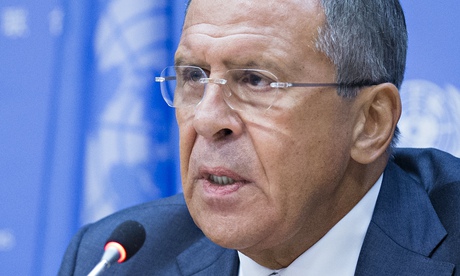Moscow's Solution
"[Russia and the European Union should develop] a common economic and cultural space from the Atlantic to the Pacific where no country would strengthen its security at the expense of the others."
Russian foreign Minister Sergey Lavrov

"[The Ukrainian civil war exampled a conflict] at the intersection of major states' geopolitical interests ... and I think it will certainly not be the last."
Russian President Vladimir Putin
Messrs. Lavrov and Putin clearly believe in their heart of hearts that, as Mikhail Gorbachov also alluded to, the West has neglected its obligations to Russia, has taken advantage of Russia in its time of need, has left Moscow with little option but to assert itself by invading its near territory, humiliating it and treating it with contempt. Clearly, Moscow's understanding from negotiations with NATO was that its near abroad would be respected.
NATO in turn just kept moving its alliance closer and closer until it went knocking just outside Russia's gates. Effectively leaving Moscow and Russia friendless and adrift in eastern Europe. Leaving Moscow little option but to push back. Not only was NATO inviting all and sundry to join them, but they were also placing the U.S. Aegis Ballistic Missile system in Poland and Czech Republic, threatening Russia.
So, little wonder Russia became aggrieved, and no longer cooperative, since its defense and alliance props were being kicked out from under them through the collaboration of insolence; the United States, European Union and NATO. Russia doesn't appreciate being kicked around. Which gave it the impetus to begin rebuilding its own arsenal of military equipment reflecting the latest technologies to counter any threats they perceive from the West.
Russia had proposed the development of equal and indivisible security to encompass the Euro-Atlantic geography; instead NATO expanded to the Russian border. Russia and the EU should look to develop a "common economic and cultural space from the Atlantic to the Pacific where no single country would strengthen its own security at the expense of the others"; reasonable, is it not among collegial nations?
Had any of this been done the civil war now raging in Ukraine would never have occurred. Russia, according to Mr. Lavrov, should have been invited to the negotiations between Ukraine and the EU's Association Agreement. Now that the civil war in Ukraine is a reality, it is incumbent on Lvov to negotiate directly with the rebels to form a decentralized government with the regions having their own foreign political and economic relations.
And just incidentally veto power on Ukraine's foreign policy. President Putin was clear; Moscow was prepared for "the most serious, concrete discussions on nuclear disarmament" and military interventions in third countries. There are those readily diagnosing the proposals who conclude that implementing Russia's recommendations would revoke the Organization for Security and Cooperation in Europe's principles of border inviolability and non-interference in affairs of other states.
Along with respect for human rights and other such fundamental freedoms, including the equal rights and self-determination of peoples. Which the military invasion (which hasn't happened according to Moscow), however, covert it is under cover of night and removing identifying symbols, of another country, and inciting and arming rebellion in other countries to manage their destinies externally, represents.
And so the European Union saw it in their self-interest to reject the Russian proposal for a bilateral Union of Europe where a single energy complex preventing Europe from seeking sources of energy elsewhere would prevail. Obviously, their experience to date with their major energy supplier has proven to be frustratingly unreliable when the president of the supplying country used their energy dependence as a cudgel when it served his political purpose.
The proposed union was meant to coordinate military, political and strategic matters Who might that empower largely but an aspiring superpower? At the same time limiting the capacity of signatory countries to reach outside their geography -- to North America, for example...
Labels: Conflict, European Union, NATO, Negotiations, Russia, Ukraine

<< Home